Morning Glory
Topic: Botanical Studies
The morning glory was in bloom one block above the beach, just south of the Santa Monica Pier, 21 August. 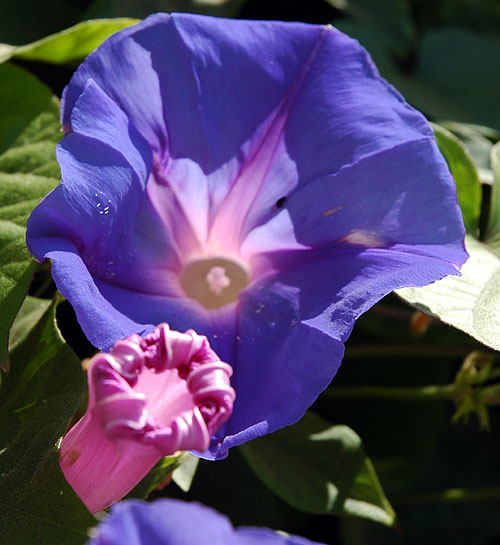
Little Tokyo
Topic: East of Hollywood
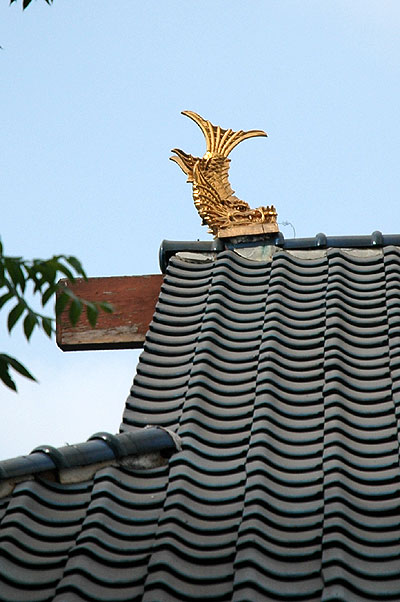 Little Tokyo is the Japanese American district in downtown Los Angeles - roughly four large city blocks, bounded on the west by Broadway, the east by Alameda Street, the south by Third Street, and the north by Temple. Or really, from the Los Angeles River to the east to downtown Los
Little Tokyo is the Japanese American district in downtown Los Angeles - roughly four large city blocks, bounded on the west by Broadway, the east by Alameda Street, the south by Third Street, and the north by Temple. Or really, from the Los Angeles River to the east to downtown Los
Angeles on the west - with City Hall and the LAPD Parker Center to the north, and the new "Artist District" to the south.
As noted here, this particular Little Tokyo dates from 1886, when Charles Kame, an ex-seaman from Japan, opened a Japanese restaurant at 340 East First Street. One thing led to another and by the turn of the century a small Issei (immigrants from Japan) community was in place around First and San Pedro Streets. The area started to be called Little Tokyo after two thousand Issei, recruited in northern California by Henry Huntington to lay tracks for the Pacific Electric Railway in 1903, were later joined by thousands more who fled the racial tensions in San Francisco following the 1906 earthquake. They were all denied citizenship under federal law, and barred from owning property by state legislation out here, and local employment and housing was pretty much closed to them, but they had this place - and the name of the game for them was fishing, agriculture (there were a whole lot if successful Japanese American truck farms across the area), wholesale produce and retailing. This was home.
Of course, unlike the Issei, the Nisei (children of Japanese immigrants) were American citizens by birth. But they didn't much like this area and left for the suburbs, and the area withered. In 1934 they started Nisei Week here to bring everyone back together for a festival of Japanese matters - calligraphy and ikebana mixed with typical "American" events, a beauty contest with its coronation and court and all that. And they promoted Nisei Week as an annual celebration of Japanese American "loyalty to the United States." But no one moved back.
And then there was what really destroyed the place, Executive Order 9066 - Franklin Roosevelt signed that on February 19, 1942. It gave the United States Army authority to displace more than a hundred and ten thousand Nikkei living on the west coast and put them in concentration camps in isolated areas out here in the West. That emptied the place. And after the war no one much moved back to this area - bad memories perhaps, or better places to live in the new suburbs. And then in the early fifties the city built its police administration building - Parker Center - on the former site of the Nishi Hongwangi Buddhist temple. That took out housing for a thousand or more, and one-fourth of the district's commercial frontage.
There was an effort to save what was left after that, resulting in the Mayor's Little Tokyo Community Development Advisory Committee, formed in 1969, and the Little Tokyo Redevelopment Project established the following year under the Community Redevelopment Agency. There was a lot of construction in the seventies and eighties - fifteen new structures and the Little Tokyo Historic District, thirteen simple and unpretentious commercial buildings on the north side of First Street. That was placed on the National Register of Historic Places in 1986. The little shops there now specialize in Japanese-language videos and DVDs, and some in Japanese electronics and video games, if you need to find Japanese video games that were never translated into English. They have them.
Now the center of things is, really, the clean and modern Japanese Village Plaza, in the very center of "Little Tokyo" - ethnic restaurants, karaoke clubs and a Boba café, and shops for tourists. It's an outdoor mall and theme park of sorts - with ghosts. Every August there still is a Nisei Week, and now the LA Tofu Festival.
But the place is not what it once was. Only about a thousand still live here, mostly elderly folks - it's mainly a work and entertainment district. Japanese Americans, if you will, now live out in Torrance and Gardena, and really all over.
Of course there are still several Buddhist temples in Little Tokyo, and a few Japanese Christian churches. And curiously Pentecostalism started in Little Tokyo. The new Japanese American Cultural and Community Center Plaza is located on the original site of the First Pentecostal Church, a multiracial congregation called the Azusa Street Mission. This is where the Azusa Street Revival started in 1906 - the Pentecostal Movement that swept across America. Earlier, it was also the site of the First AME Church.
__
The last intact block of Little Tokyo to survive massive redevelopment in the seventies and eighties - thirteen buildings on First Street were placed on the National Register of Historic Places in 1986 - 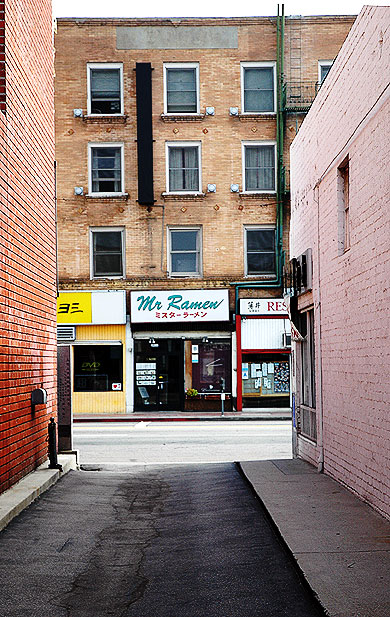
A temple hidden in an alley (the view the other way from the shot above) -
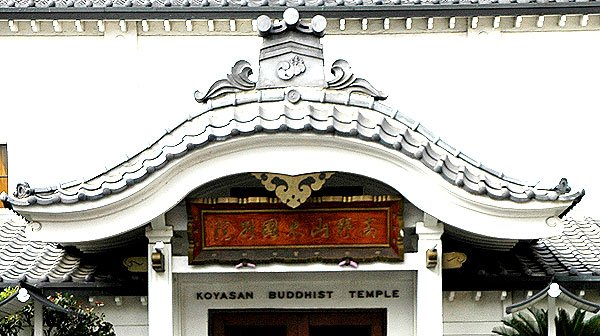
Reflections - not a temple -
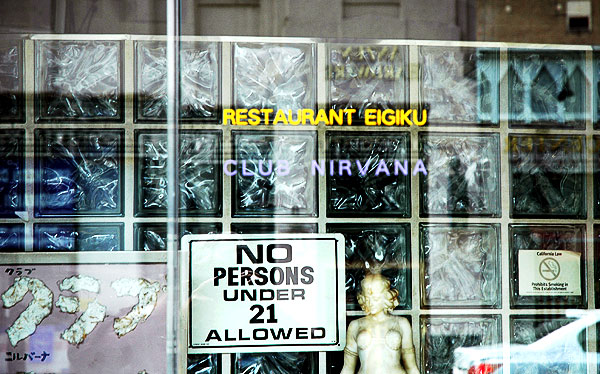
Seriyu-en (Garden of the Clear Stream) - Takeo Uesugi, 1979 (also known as the James Irvine Garden) - 244 South San Pedro Street, behind the Japanese American Community and Cultural Center -
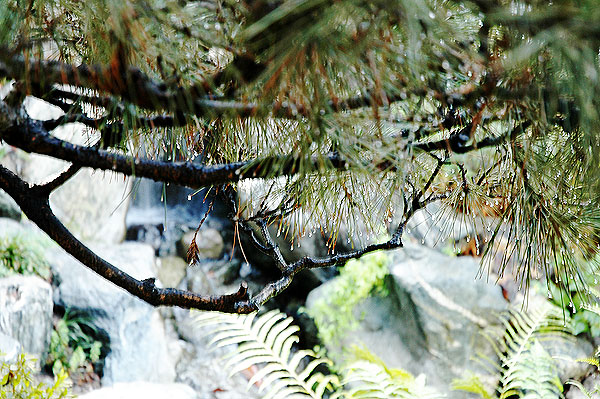
You'll find a full array of more than thirty photographs of Little Tokyo, with more background and detail, in this weekend's Just Above Sunset, to be posted early Sunday morning, August 27th.
Blue Shadows
Topic: Light and Shadow
The south face of the Hollywood Center Building - Hollywood Boulevard at Cherokee - Wednesday, 23 August 2006, mid-afternoon. 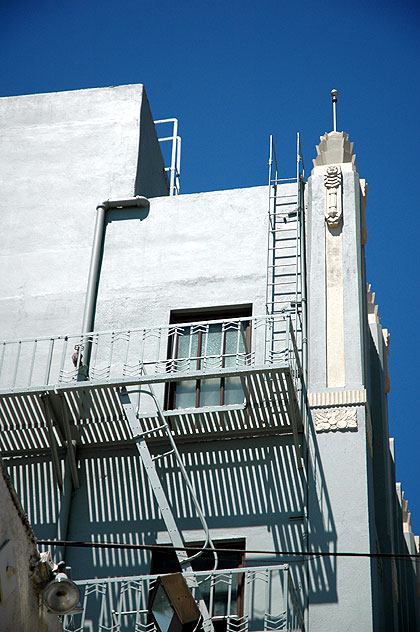
Hollywood Center Building - Hollywood Boulevard at Cherokee - the first home of the Screen Actors Guild and of the Writers Guild of America - 1929, by Norton and Wallis - an example of the subset of Art Deco know as Zigzag Moderne - "Zigzag Moderne developed from the classical-inspired designs of Bertram B Goodhue, the vertical Gothic schemes of Eliel Saarinen, the forms of the Paris Exposition des Arts Decoratif of 1925, and the early twenties designs of Frank Lloyd Wright."
Hollywood Calling
Topic: Light and Shadow
A complex shot - in the window of a combination souvenir and pawn shop in the 6600 block of Hollywood Boulevard, junk for sale, Wednesday, August 23rd. The street is reflected in the upper right quadrant - jacaranda and the tourist looking at this stuff for sale - the Tweety Bird and Snow White's Castle phones, and the poster of the lighthouse at sunset. It's a bit of looking in from the real world into something else entirely. 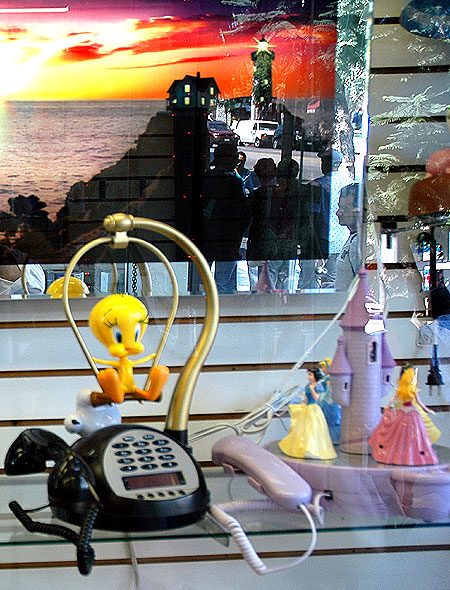
Phones for sale - and there's something ineffably sad here -
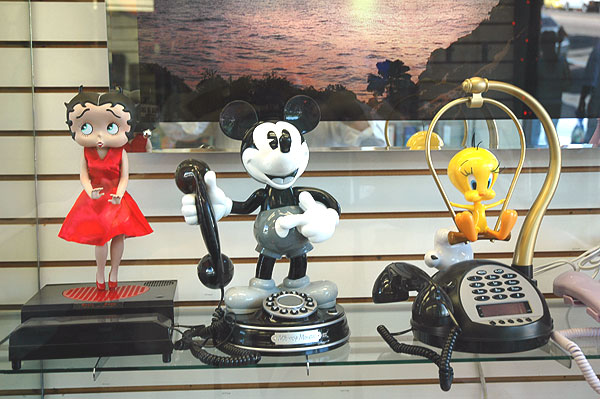
Everyday Surrealism - Santa Monica International Chess Park
Topic: West of Hollywood
Everyday Surrealism - Santa Monica International Chess Park
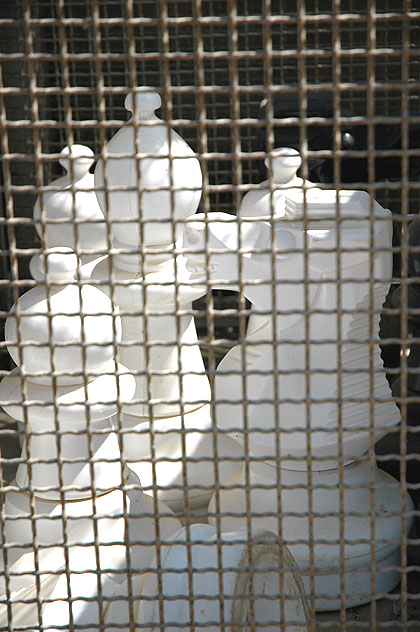
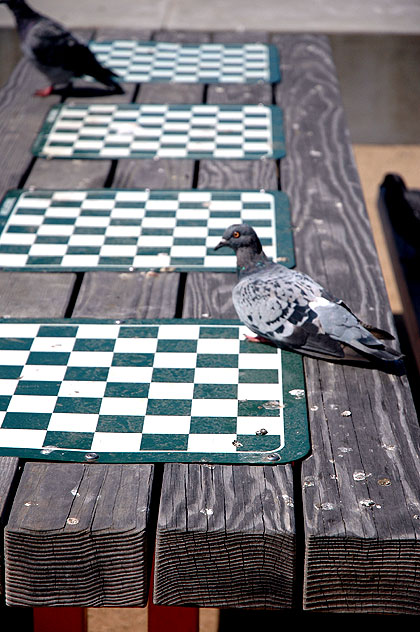
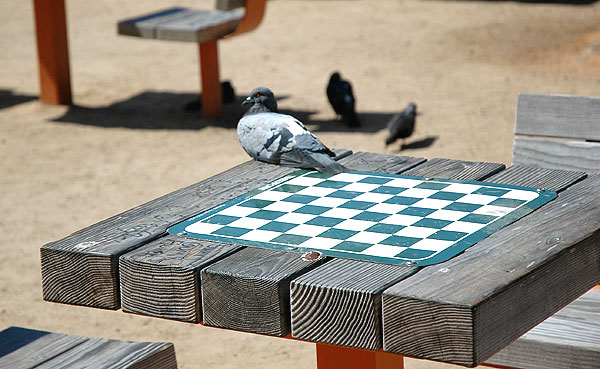
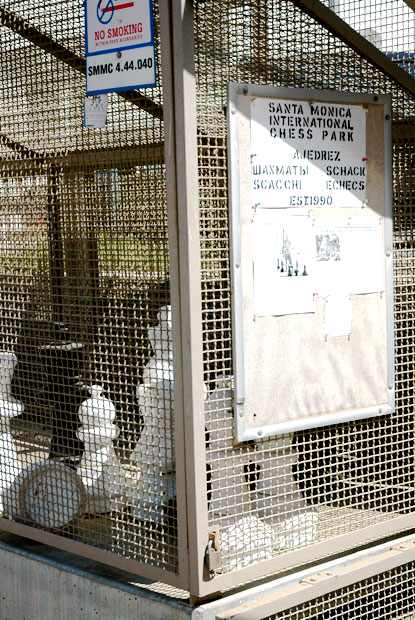



 Little Tokyo is the Japanese American district in downtown Los Angeles - roughly four large city blocks, bounded on the west by Broadway, the east by Alameda Street, the south by Third Street, and the north by Temple. Or really, from the Los Angeles River to the east to downtown Los
Little Tokyo is the Japanese American district in downtown Los Angeles - roughly four large city blocks, bounded on the west by Broadway, the east by Alameda Street, the south by Third Street, and the north by Temple. Or really, from the Los Angeles River to the east to downtown Los 









